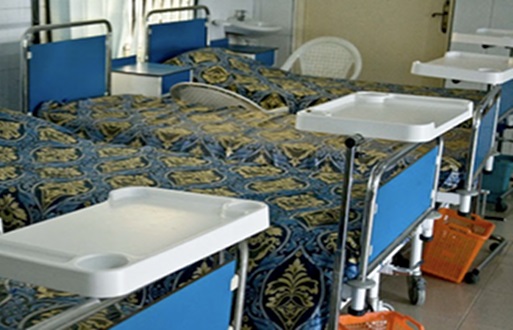
News:
On the 8th of April, the news site “allAfrica.com” ran an article entitled, “Nigerian Women Dying to Give Birth” that discussed the high rate of maternal deaths in the country. It began with the story of Nkechi, a 9-month pregnant woman in Nigeria who as a result of successive delays in accessing adequate healthcare after going into labour lost her baby and bled to death. Those delays included enduring a 3 hour, 25 kilometres journey to reach the nearest hospital, after which she waited almost 6 hours before being seen by a doctor due to staff shortages, and then was refused admission due to insufficient beds. The writer of the piece commented, “getting pregnant in Nigeria is almost a suicide mission”. A 2012 World Health Organisation publication, “Trends in Maternal Mortality” put the Maternal Mortality Rate (MMR) in Nigeria at 630 per 100,000 live births. The country ranks second highest in the world in maternal deaths and yet this problem is yet to be addressed as an important public health concern by Nigeria’s government.
Comment:
Many other countries in the Muslim world, such as Pakistan, Afghanistan, and Yemen are also grappling with very high MMR’s due to poor access to adequately equipped and sufficiently staffed hospitals. In Nigeria today, according to a 2013 study by the Lagos State Civil Society Partnership and other organizations on the accessibility and quality of Primary Healthcare Centres (PHC) in the country, deliveries in many of these facilities are still taking place under candle or lantern light with staff on occasions contributing their own money to enable supply of electricity. Additionally, doctor to patient ratio in most of these PHC’s is 1 to 1,653. One Professor of Obstetrics and Gynaecology in Assuit University, Egypt commented, “Women are not dying because of diseases we cannot treat, rather they are dying because societies are yet to make the decision that their lives are worth saving.”
Incidentally, on Sunday 6th April, following the rebasing of its Gross Domestic Product (GDP), economists ranked Nigeria as the 26th largest economy in the world and Africa’s biggest economy, growing at around 7% annually. It is also Africa’s largest oil exporter, the world’s 10th largest oil exporter, and according to BP has the world’s 9th largest gas reserves. OPEC has placed the value of its petroleum exports at $94.64 billion, and the country has earned more than $600 billion in revenues over the last 5 decades. Despite all this, in addition to its crumbling healthcare system, Nigeria has been listed by the World Bank as one of 5 countries with the highest number of extremely poor people, with India – another country with high economic growth – also included in that list. 70% of Nigeria’s population live in extreme poverty, earning less than $1.25 a day.
All this illustrates the total disconnect between the GDP and economic growth of capitalist states and the standard of living of ordinary citizens within their societies. It demonstrates that the growth in wealth under the capitalist system is enjoyed only by the rich elite while the masses are reduced to living lives of crippling poverty and forced to endure a shameful level of public services due to flawed economic policies that concentrate wealth in the hands of the few rather than distributing it fairly amongst the society. And its further indictment of the non-Islamic regimes in our Muslim lands which have shown repeatedly that their priorities do not lie in taking care of the needs of the people but in enriching themselves. Furthermore, it is unquestionable that the kufr systems they implement upon the people are utterly inept in managing the affairs and wealth of their societies, in addition to allowing corruption to become endemic in politics and their states.
Addressing the high maternal mortality rates within our lands requires rule by a governing system that truly understands the value of human life and prioritises taking care of the needs of the people. It requires a system that does not measure its success on its GDP figures or the height of its buildings but on the justice, equity, and tranquillity it creates for its citizens and how well they are looked after. It is the Khilafah state alone, in which the ruler is the guardian and servant of the people which represents this type of leadership, as the Prophet (saw) stated,
«كلكم راع وكلكم مسئول عن رعيته الإمام راع ومسئول عن رعيته»
“Each of you is a guardian and is questioned over his subjects, the Imam is responsible over the people and he is questioned over his responsibility….”
Under the Khilafah historically, economic growth and prosperity was complemented by an elevation in the living standards of the people and the quality of public services, as at the time of the Khilafah of Umar bin Abdul Aziz, under whose rule poverty was wiped out of North Africa. Under this System of Allah (swt), Khalifahs competed in building the best hospitals and schools to serve their people which were the envy of the world, including providing mobile dispensaries to treat those in rural areas. In his book, “From Witchcraft to World Health”, Dr. Sam Leff, an expert on healthcare services across the world, writes regarding the Abbassid Khilafah that every city had its own hospital. Baghdad alone had 60 well-equipped, well-organised hospitals which were generously supported from the state treasury and discharged treatment free of charge. Such medical facilities became the prototype for modern-day hospitals today. These were the fruits that this Ummah was blessed with by making Islam and its laws alone the basis of their system and society – fruits that will only return through the re-establishment of the exemplary Khilafah state in our Muslim lands.
Written for The Central Media Office of Hizb ut Tahrir by
Dr. Nazreen Nawaz
Member of the Central Media Office of Hizb ut Tahrir
